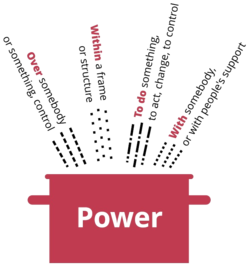In light of the ideal form of participation, the crucial question for facilitators is how to support people to reach the top rungs of the ladder of participation, becoming effective leaders and empowered individuals with their social groups, communities and societies as a whole. Since the possibilities for participation are related to power, the fundamental didactical approach we promote is empowerment.
On an individual level, empowerment is feeling, accepting, and using one’s individual power to take self-motivated independent action. In education and training, empowerment can be understood as a process of gaining competencies in public social activity, cooperative self-organization, and involvement in public decision-making. Empowerment for successful civil engagement addresses the dimension of power in social activities.
Definition
Empowerment is a process of promoting skills in public social activity, cooperative organization, and involvement in public decision-making. It deals with questions like:
- How do you gain power?
- How do you use power?
- How do you shape power relations?
- How can you influence socially relevant conversations and decisions?
Addressing self-responsibility and autonomy
On an individual level empowerment is feeling, accepting, and using one’s individual power in terms of self-responsible independent action. In education and training it can be understood as a process of gaining competencies for public social activity, cooperative self-organization, and involvement in any public decision-making.
Collaboration and Cooperation
Empowerment can happen at different stages of an initiative, project, or organizational development and can be manifested in various ways. When empowering people we:
- shape opportunities for them to take responsibility
- help them to gain key competences required for completing certain tasks and challenges, concrete civic competences
- advocate for a better quality of participation
- organize learning processes according to modern didactical principles
Power is the ability to actively influence the decision-making capacity of an individual, a group, or a whole society and to affect the way relevant socio-political topics are discussed among citizens.
Participation refers to the different mechanisms people use to express their opinions and to influence the decision-making that takes place in different spheres (political, social, economic, etc.) and at different social levels.
Empowerment equips participants with the competencies needed to make an impact in their communities as a group. Cooperative learning is an approach which supports this by encouraging group interaction in the learning process.
Let’s face it: inspiring teachers, facilitators, and other people are not the only reason why students and participants get socially involved. People have many different reasons for working for the social good – psychological advantages, internalized values, social norms, or (in)direct profit.
Navigation:
 Understanding
Understanding
Empowerment is a process of gaining competencies for public social activity, cooperative selforganization and involvement in any public decision-making.







